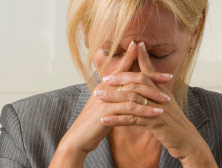MigraineHelper.com
 |
 |
 |
 |
Tips to Prevent Your MigrainesCertainly, no one enjoys having a migraine. While not all preventative measures can ensure that a person won't have a migraine, they are certainly worth a try. There are many ways to try to prevent a migraine. Each person will need to try out these suggestions for herself to find something, or a combination, that works for her individual needs. ExercisesThere are a number of exercises that are recommended to help prevent migraines. These include progressive muscle relaxation, medication and yoga. You can either do these activities with others in a structured class, or get a book or tape to walk you through the process by yourself. If you don't like the idea of a structured class or routine, try to have half an hour a day that is designated for a relaxing activity. This might be gardening, swimming, resting, reading, or anything else that you really enjoy doing. Sleep Well, But Not Too MuchTry to regulate your sleep and keep yourself in a routine. Too little or too much sleep can trigger a migraine. The average adult needs six to eight hours of sleep. The sleep should be at regular intervals, and the sleep that you have before midnight is actually more restful and helpful than sleep after midnight. Headache DiariesKeeping a headache diary can help you to follow patterns and behaviors that might be triggering your migraines. Write down foods that you eat, activities that you are involved in, stresses that you experience, and when you get migraines. This will be very helpful to your doctor if you need to have a medical consultation. Migraine Triggers - FoodsResearchers have found a large list of migraine triggers. These are items that they have found trigger migraines in the majority of migraine sufferers. Certainly, these items don't trigger migraines in everyone, nor do they trigger them in the same way or to the same degree for each person. It might be helpful to explore these items, however, if you are a migraine sufferer. The triggers include: aged cheese, alcohol, MSG, chocolate, caffeine, hot dogs, bacon, avocado, pickled foods, yeast, onions, nuts, and diet sweeteners. Other Migraine TriggersOther migraine triggers that aren't food related items may also cause migraines to come on. These might include antibiotics, H2 blockers and vasodilators. It could also be menstruation, oral contraceptive pills, and hormone replacement therapy. Skipping meals, changes in your sleep patterns and added stress might also trigger migraines. Finally, high altitudes, jet lag and changes in weather may also play a role. If you find that none of these environmental and behavioral factors seem to be triggering your migraines, you should probably speak to a medical professional. There are many medicines on the market today that try to prevent migraines, and help people who are frequent migraine sufferers. You certainly don't have to live with the debilitating pain of migraines without exploring your preventative options. Good luck - and here's to a headache-free future! |
n |